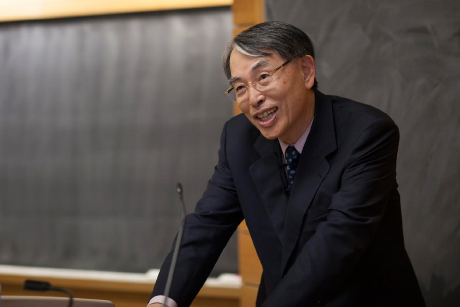International court tries to avert disasters, establish norms
By Aaron Coven

Judge Sang-Hyun Song, president of the International Criminal Court (ICC), focused on the court’s preventive potential to make genocide, use of child soldiers and human rights violations unacceptable in an Oct. 9 campus talk.
When Song was nine years old, armed conflict broke out in his home country of Korea and his family hid for three months during the Battle of Seoul. Song said he was “old enough to realize the horrors of war,” and his childhood experiences inspired him to devote his life to the “search for justice and improvement of society through the rule of law.”
Joining the ICC in 2003, Song was again confronted with war atrocities, such as genocide and the use of child soldiers. He said the ICC is instrumental in preventing and deterring these crimes, but that’s a small task: “Changing the world for the better is really hard work.”
As part of the international justice system, the ICC deals with crimes of the past and enacts preventive measures to discourage future offenses through four main tools, Song said.
Deterrence, the most direct effect of international justice, is hard to measure, and evidence of its effect thus far is “largely anecdotal,” Song said. Timely intervention means the court can react to threats at an early stage, open preliminary examinations of events occurring within its jurisdiction, and influence stakeholders to take action. Stabilization connotes the court’s capacity to facilitate transitional justice by allowing victims to participate in criminal proceedings and to receive reparations and assistance.
Norm-setting – making crime culturally unacceptable – is the ICC tool with the greatest potential to have a significant preventive effect, he said. Strong international support is key, he added, and will further reinforce core societal values and laws.
The ICC’s challenges include the sometimes-lacking capacity of national jurisdictions, ensuring that states cooperate with the court and achieving universality, he said.
“The long-term value of the ICC lies not only in the punishment of perpetrators, but also, perhaps [even more so], in the prevention of future crimes,” Song concluded. “That has been a great source of motivation for me during the last 11 years that I have served at the ICC.”
Song spoke as part of the Mario Einaudi Center for International Studies’ Distinguished Lecture Series. The lecture was co-sponsored by the Cornell Law School.
Aaron Coven ’16 is a writer intern for the Cornell Chronicle.
Media Contact
Get Cornell news delivered right to your inbox.
Subscribe